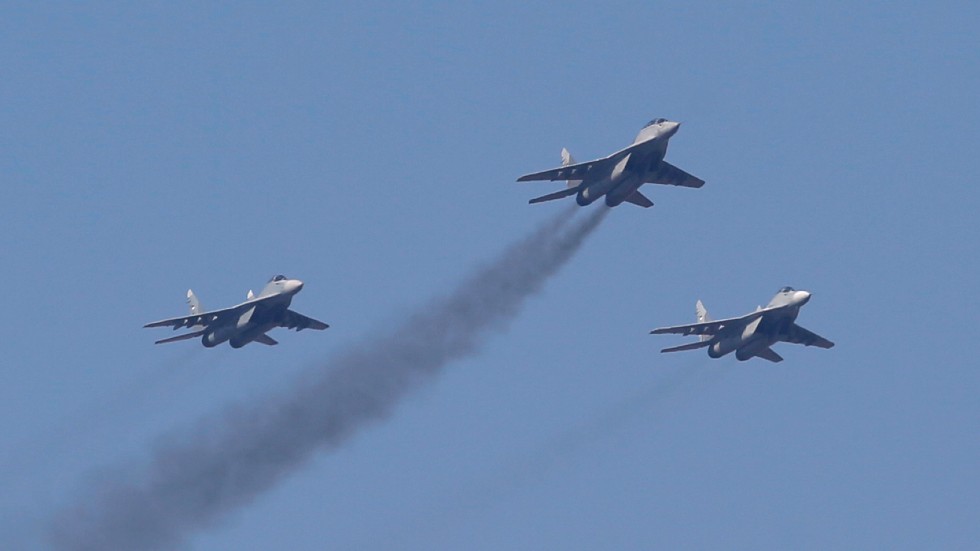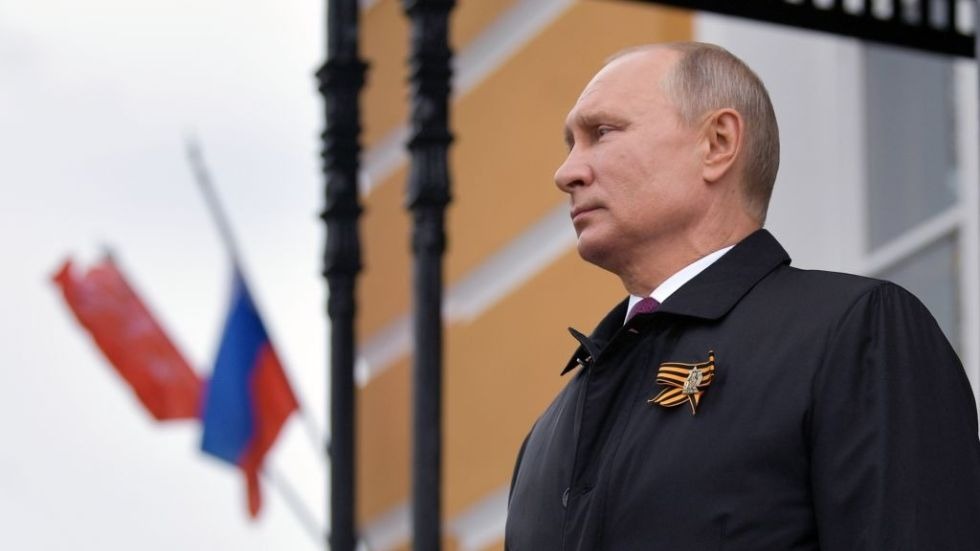Overnight Defense & National Security — More help headed Ukraine’s way
It’s Tuesday, welcome to Overnight Defense & National Security, your nightly guide to the latest developments at the Pentagon, on Capitol Hill and beyond. Subscribe here: digital-staging.thehill.com/newsletter-signup.
Poland said it is handing over its old, Russian-made MiG-29 jets to the United States, a move that would set the stage for an eventual transfer to Ukraine’s military to help in the brutal attack on the country by Russia, but the Pentagon doesn’t think it’s a great plan.
We’ll lay out what Poland has said, the complications around such a transfer and the Biden administration’s response. Plus: Details on a the multibillion-dollar Ukraine aid package deal reached by Congress, what intelligence officials are warning about the Kremlin and Biden’s newly announced benefits for veteran victims of burn pits.
For The Hill, I’m Ellen Mitchell. Write to me with tips at emitchell@digital-staging.thehill.com.
Let’s get to it.
Poland, Pentagon disagree over MiG transfer

The Polish government on Tuesday said it is ready to “immediately” deploy its entire fleet of MiG-29 fighter jets to a U.S. air base in Germany, giving Washington the chance to then send the planes to Ukrainian forces.
“After consultations between the President and the Government,” Poland is “ready to deploy – immediately and free of charge – all their MIG-29 jets to the Ramstein Air Base and place them at the disposal of the Government of the United States of America,” Poland said in a statement.
“The Polish Government also requests other NATO Allies – owners of MIG-29 jets – to act in the same vein.”
Why this matters: The transfer of the Soviet-era fighter jets is notable as Ukraine for days has pleaded with Western officials to help it counter the brutal Russian assault on the country with either a “no-fly zone” over its airspace or the transfer of aircraft that Ukrainian pilots could fly.
Ukrainian President Volodymyr Zelensky on Saturday implored U.S. lawmakers to send the Russian-made MiGs, which Ukrainian pilots are already trained to fly.
The issues: But the deal initially seemed unlikely, as the United States and other nations have been reluctant to draw the ire of Russia with such a major arms transfer. Moscow has warned that any nation that gives Ukraine aircraft to use to fight Kremlin forces could be seen as participating in the conflict.
On Sunday, Secretary of State Antony Blinken said the plan had gotten “the green light” from the U.S. and that the Biden administration would then work to backfill the Polish military, reportedly with F-16 fighter jets.
But the White House on Monday tempered expectations, with press secretary Jen Psaki on Monday pointing to the complicated logistics of backfilling planes for its allies.
NO PRIOR NOTICE
Undersecretary of State for Political Affairs Victoria Nuland said that Poland’s offer to transfer the jets wasn’t “preconsulted” with the United States prior to the Tuesday announcement.
“I saw that announcement by the government of Poland as I was literally driving here today,” Nuland told lawmakers at a Senate Foreign Relations Committee hearing.
“So to my knowledge, it wasn’t pre-consulted with us that they plan to give these planes to us,” she said.
Not a ‘tenable’ proposal: Later on Tuesday, the Pentagon appeared to close the door on Warsaw’s plans, announcing in a statement that it does “not believe Poland’s proposal is a tenable one.”
“Poland’s proposal shows just some of the complexities this issue presents. The prospect of fighter jets ‘at the disposal of the Government of the United States of America’ departing from a U.S./NATO base in Germany to fly into airspace that is contested with Russia over Ukraine raises serious concerns for the entire NATO alliance,” press secretary John Kirby said in the statement.
“It is simply not clear to us that there is a substantive rationale for it. We will continue to consult with Poland and our other NATO allies about this issue and the difficult logistical challenges it presents, but we do not believe Poland’s proposal is a tenable one.”
Kirby allows that it’s ultimately Poland’s decision to transfer the aircraft and that defense officials are in contact with the Polish government to discuss the issue.
Congress reaches deal on billions for Ukraine

Congressional leaders have reached a deal to provide roughly $14 billion in Ukraine-related aid, which they expect to include in a massive government funding package.
Senate Minority Leader Mitch McConnell (R-Ky.) announced the deal, which will include humanitarian assistance and military aid in response to Russia’s invasion of Ukraine.
“Where we’ve ended up is at $14 billion,” McConnell said, though an aide confirmed there was a deal but tagged the figure closer to $13.5 billion.
A massive package: The spending is being dropped into a massive government funding package that congressional leaders are aiming to unveil on Tuesday.
The spending is higher than the $6.5 billion initially requested by the administration and the $10 billion in the White House’s formal request to Congress.
‘Like pulling teeth’: But congressional leaders had signaled they were likely to build on that, in part to give the administration more flexibility in providing additional assistance to Ukraine. The final deal is even higher than the $12 billion floated by Schumer on Monday.
Even as the figure steadily ballooned, McConnell knocked Democrats, accusing them of wanting to decrease security assistance and loan guarantees to Eastern European allies.
“It’s been like pulling teeth,” McConnell said.
Still needed: Congress needs to pass the government funding bill and have President Biden sign it by the end of Friday to prevent a government shutdown.
Congressional leaders decided to attach the Ukraine aid to the government funding bill in order to speed up its path through Capitol Hill, but are also hopeful of the opposite — that attaching the Ukraine package will help shore up support for the larger funding bill.
SIGN UP NOW
⏱ Don’t miss a beat! Get on the list for NotedDC, The Hill’s new insider take on the heartbeat of politics and policy, coming soon.
Biden outlines new benefits for vets

President Biden on Tuesday traveled to Texas to discuss expanding benefits for veterans exposed to toxic chemicals from burn pits.
In a speech at Resource Connection of Tarrant County in Fort Worth, Texas, Biden lauded the veterans who served in Iraq and Afghanistan, calling them “an incredible generation” of servicemembers.
“This is an incredible generation, the 9/11 generation that fought. They served in a way I think that maybe they’re right up there with the greatest generation because they not only got deployed once, but sometimes twice, three, four times into harms’ way,” Biden said.
A new rule: He called on Congress to pass a law to ensure care for veterans exposed to toxic chemicals while serving in Iraq and Afghanistan. He also announced a new rule that will add several rare respiratory cancers to the list of presumptive conditions for certain veterans.
“Not only did they face the dangers of the battlefield, but they were breathing toxic smoke and burn pits,” the president said of servicemembers who served in Iraq and Afghanistan.
A personal mission: The issue of burn pits strikes a personal note for the president, who believes the chemicals from burn pits may have contributed to the brain cancer that ultimately killed his son, Beau.
“When our troops came home, the fittest among them, the greatest fighting force in the history of the world, too many of them were not the same. Headaches, dizziness, numbness, dizziness, cancer,” Biden said. “We don’t know yet enough about the connection between burn pits and each of these diseases, so many of our veterans are now facing but I’m committed, I’m committed to…make the commitment to find out anything we can.”
Read more about the speech here.
Intel chiefs: Putin set to ‘double down’

Intelligence experts Tuesday painted a picture of an increasingly determined Vladimir Putin set to “double down” on his invasion of Ukraine despite being ill-prepared for the consequences to Russia’s economy and with little prospect for long-term success.
“I think Putin is angry and frustrated right now. He’s likely to double down and try to grind down the Ukrainian military with no regard for civilian casualties,” CIA Director William Burns told lawmakers on the House Intelligence Committee during the yearly worldwide threats hearing.
“But the challenge that he faces, and this is the biggest question that’s hung over our analysis of his planning for months now…is he has no sustainable political end game in the face of what is going to continue to be fierce resistance from Ukrainians.”
The dominating topic: Russia’s intervention in Ukraine dominated an annual hearing designed to review a vast number of threats facing the U.S., unifying a committee, whose members have at times been critical of the intelligence community, in heaping praise on the five officials assembled before them.
Miscalculations: Intelligence officials outlined numerous miscalculations by Putin as Russia continues its devastating assault on Ukraine.
Putin has been “stewing in a combustible combination of grievance and ambition for many years,” Burns said, and his inner circle of advisors has shrunk as he has created “a system in which it’s not proven career enhancing for people to question or challenge his judgment.”
“So he’s gone to war I think on the basis, Mr. Chairman, of a number of assumptions which led him to believe that Russia faced a favorable landscape for the use of force against Ukraine this winter,” he said.
“He’s been proven wrong on every count.”
Chances of an escalation: Director of National Intelligence Avril Haines said that while Putin anticipated sanctions, he did not foresee the degree that the U.S., other nations, and private companies would “undermine his capacity to mitigate Western actions.”
“We assess Putin feels aggrieved the West does not give him proper deference and perceives this as a war he cannot afford to lose but what he might be willing to accept as a victory may change over time given the significant costs he is incurring,” she said.
“Nevertheless, our analysts assess that Putin is unlikely to be deterred by such setbacks and instead may escalate, essentially doubling down,” Haines said.
THE WAR, BY THE NUMBERS
Russia’s war in Ukraine is taking a devastating toll on the Ukrainian civilian population as Moscow accelerates attacks on nonmilitary targets.
The fighting has led to a historic flight from Ukraine by refugees, some of whom have been caught in the crossfire.
The war has no end in sight despite talks between Kyiv and Moscow about ending the fighting, which have had no success. Ukraine’s forces have limited the Russian onslaught, but many foreign observers remain skeptical they will be able to hold out against Russia’s much larger army.
Read about the war by the numbers as it closes its second week.
ON TAP FOR TOMORROW
- The House Armed Services Committee will hold a hearing on “National Security Challenges and U.S. Military Activities in the Indo-Pacific Region,” at 9 a.m.
- The Mitchell Institute for Aerospace Studies will host a virtual event with Audrey Schaffer, director for space policy at the National Security Council, at 10 a.m.
- The Wilson Center, will hold a discussion on “The Russian War in Ukraine: The Situation After Two Weeks,” at 10 a.m.
- The Stimson Center and Washington Foreign Law Society will hold a virtual discussion on “Acts of War? Accountability for Cyberattacks in Ukraine,” at 12:30 p.m.
- The Atlantic Council will host a virtual discussion on “Navigating the New Strategic Realities of Space,” with U.S. Space Command head Army Gen. James Dickinson, at 1 p.m.
- The American Security Project will discuss the crisis in Ukraine, with former European Union High Representative for Foreign Affairs and Security Policy Catherine Ashton, at 2 p.m.
WHAT WE’RE READING
- Ukraine claims second Russian general killed in battle
- Russian forces have fired nearly 670 missiles at Ukrainian targets: US
- Russia likely to escalate attacks despite setbacks: US intelligence officials
- Proud Boys leader indicted on conspiracy charge over Jan. 6
- White House expands intelligence allowed to be shared with Ukraine: report
- Iran’s Revolutionary Guard launches second surveillance satellite: state TV
- DOD: Gitmo detainee who sought to participate in 9/11 sent home to Saudi Arabia
- The Hill: Opinion: Back to the future: Why spies and reporters still need human intelligence
We want to hear from you! Take our newsletter survey to provide feedback on our offerings.
That’s it for today! Check out The Hill’s defense and national security pages for the latest coverage. See you Wednesday.
Copyright 2024 Nexstar Media Inc. All rights reserved. This material may not be published, broadcast, rewritten, or redistributed..







